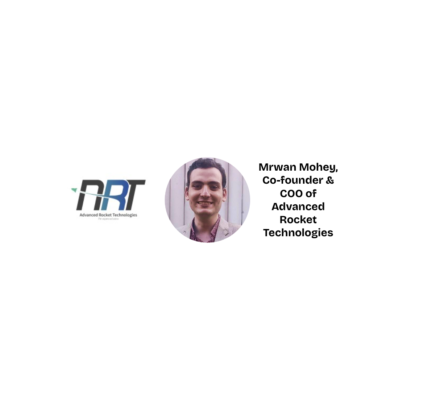The Future of Aerospace: An Inside Look at the Vision and Strategy of Promin Aerospace with CEO Misha Rudominski

We had the pleasure of speaking with Misha Rudominski CEO of Promin Aerospace, a Ukrainian company that’s using advanced autophagic rocket propulsion technology to revolutionize space exploration and development. Misha shared their insights on the future of the space industry, the role of private companies in space exploration, and the challenges that Promin Aerospace faces in the market. They also talked about exciting upcoming projects and partnerships, including collaborations with defense manufacturers to enhance missile technology. Throughout the interview, the Misha highlighted their commitment to innovation, collaboration, and proactive problem-solving, which are key elements of their leadership style.
How do you see the space industry evolving in the next decade?
I think the space industry is gonna go through some pretty exciting changes in the next ten years. We’ll see more companies, big and small, jumping into the game and trying out new ideas. But with the world getting more polarized, there’s definitely going to be more focus on nationalization in this industry too. Governments will want to keep their tech and innovations close to home, and we might see a bit of a competitive race between countries. That being said, I still believe there’ll be opportunities for collaboration between governments, private companies, and even regular folks who are passionate about space. I expect we’ll see some cool advancements in areas like satellite tech, space tourism, and even getting us closer to living on other planets.
What do you think are the biggest challenges that the space industry will face in the near future?
There are a few big challenges that come to mind for the space industry. First off, there’s the issue of space debris. With more and more satellites and missions being launched, we need to find ways to clean up and manage all that stuff floating around up there.
Another challenge is the cost of space exploration. While it’s getting cheaper, it’s still pretty expensive to send stuff into space. We need to work on making it more affordable and accessible so that more people can get involved and contribute their ideas.
Lastly, I think we need to figure out the whole international cooperation thing. Like I mentioned before, the world’s getting more polarized, and we need to find ways to work together on common goals like space exploration and research, even if there are competitive aspects to it.
How do you envision the role of private companies in space exploration and development?
I envision private companies playing a significant role in the future of space exploration and development, primarily because they often operate more efficiently and are highly customer-focused. This unique approach allows them to identify and address specific needs and opportunities within the industry, which in turn drives innovation and progress.
What inspired you to launch Promin Aerospace, and what is your ultimate goal for the company?
I’ve always been captivated by space and the idea of pushing the limits of what we know. This lifelong passion led me to seize the opportunity to make a real difference in the space industry, and that’s how Promin Aerospace was born, with a fantastic co-founder and team backing it up.
Our ultimate goal is to revolutionize space exploration and development through our work on advanced autophagic rocket propulsion. We believe that this cutting-edge technology has the potential to drastically improve the efficiency and sustainability of space travel, opening up new possibilities for exploration and even commercial applications.
How does Promin Aerospace differentiate itself from other aerospace companies in the market?
We realized at some point that we didn’t want to be just another rocket-building company. We decided to focus on developing a technology that’s fundamentally different in terms of cost and performance. Our solution tackles the issue of passive mass by gradually burning the rocket’s structure during flight, which minimizes the weight it carries into space. This approach makes our rockets more efficient and requires less fuel to complete their missions. As a result, they become more affordable for clients. It’s particularly noticeable in smaller launch vehicles.
What are the biggest challenges facing Promin Aerospace, and how are you addressing them?
Some of the biggest challenges we face at Promin Aerospace include staying ahead in a competitive market, securing funding, and navigating the complex regulatory landscape of the space industry.
To stay ahead in this competitive field, we’re committed to continuous research and development. We invest heavily in our team’s expertise and encourage a culture of innovation that enables us to develop cutting-edge autophagic rocket propulsion technology.
Securing funding can be tough for a company working on advanced tech like ours. To address this, we actively engage with potential investors, government agencies, and partners who share our vision. We also focus on showcasing the value of our technology and its potential applications to attract interest and support.
Finally, the complex regulatory environment of the space industry can be challenging to navigate. We work closely with legal experts and maintain open communication with relevant authorities to ensure compliance with all applicable regulations. This proactive approach helps us avoid potential roadblocks and keep our projects on track.

Can you talk about any exciting upcoming projects or partnerships that Promin Aerospace is involved in?
Sure, we’ve got some really cool stuff in the pipeline at Promin Aerospace. We’ve already secured $6.5 million in pre-orders for our future products and services through letters of intent, which is super exciting. We’ve also got agreements with two spaceports to carry out our technical validation and commercial launches.
Our client base is pretty diverse – we’re looking to work with unicorn startups, universities, and small businesses from all over the world. And we’re thrilled to be partnering with some amazing organizations like the Space Agencies of Ukraine, the UK, and Saudi Arabia.
How do you see Promin Aerospace’s technology and expertise being utilized in the defense industry, and what specific applications or projects are you currently working on in this space?
Right now, we’re focusing on teaming up with defense manufacturers to make the most of our technology. We’ve had some chats with the folks at Yuzhnoe and Yuzhmash in Dnipro, and it’s clear that our tech can really give their missiles a boost. We’re talking about rockets carrying payloads 2-3 times bigger than before, without increasing the size of the rocket itself. We’re looking at potentially testing missiles with our engines within the next three to four years. And if all goes well, we could see our technology integrated into the armed forces’ arsenal in about five years.

What is your leadership style like, and how do you foster a culture of innovation and growth at Promin Aerospace?
I’d describe my leadership style as a mix of openness and decisiveness. I believe it’s essential to create an environment where everyone feels comfortable asking questions and offering their input or criticism. I think this open dialogue helps us come up with better ideas and solutions as a team.
At Promin Aerospace, I strive to foster a culture of innovation and growth by encouraging everyone to share their thoughts and perspectives. We value diverse opinions and experiences, as they can lead to breakthroughs we might not have otherwise considered.
However, once we’ve had thorough discussions and weighed all the options, I do make the final call, and it’s important for the team to respect and support that decision. This approach allows us to move forward with a clear direction while still benefiting from the collective wisdom and creativity of the entire team.




